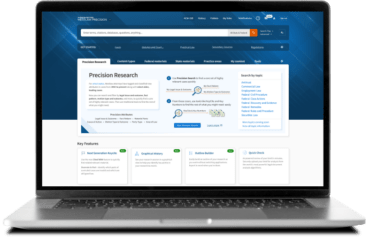Westlaw Precision users are now able to experience state-of-the-art generative artificial intelligence (AI) in legal research.
AI-Assisted Research on Westlaw Precision with CoCounsel is the first generative AI offering from Thomson Reuters and will help legal professionals find the answers they need faster and with high confidence.
Jump to ↓
“We’ve used AI to serve up editor-created answers for over a decade,” said Erik Lindberg, Senior Director of Westlaw Product Management at Thomson Reuters. “What’s different now is that we’re generating a new response just for your question, rather than retrieving prewritten responses. AI-Assisted Research can generate answers in real-time, reflecting current law across jurisdictions. Researchers can get answers to a far broader array of questions than what we could anticipate with human power alone.”
AI-Assisted Research uses a large language model (LLM) that analyzes trusted content on Westlaw to generate answers. The content analyzed includes cases, statutes, and regulations. The LLM also relies heavily on the editorial enhancements the Westlaw attorney-editors add to these primary law sources, which include the West Key Number System, headnotes, and KeyCite.
“Our attorney editors have spent nearly 150 years preparing us for generative AI,” Lindberg said.
Because of how they have structured our content and added human interpretation to it – really since the first volume of the National Reporter System – we can quickly and reliably generate an answer to nuanced legal questions supported by authoritative search results.
Senior Director, Westlaw Product Management
Running an AI-assisted search
The AI-Assisted Research tab will be the default homepage tab for Westlaw Precision with CoCounsel users, though you can easily toggle to the Precision Research or other content tabs if you prefer. Once you enter your question and hit “Submit”, the LLM goes to work, along with the retrieval augmented generation (RAG) engine that allows users to understand how the response was generated.
First, tools for the legal domain look for applicable primary law. The underlying content that is searched is extremely important. Many LLMs use training data as of a certain point in time, and their responses won’t reflect anything that happened after that time. But the law continues to evolve, and because the LLM is relying on Westlaw’s primary law, AI-Assisted Research is constantly taking in and learning from the latest and most relevant law.
Once it has selected the relevant documents, it generates a response to your question. “This is incredibly powerful when you’re starting your research,” Lindberg said. “Westlaw is able to tell you what the law is even if that requires information from multiple authorities.” Importantly, the response also includes footnotes so you can see the legal passages that informed the response.

AI @ Thomson Reuters
Sign up for insights, updates, and all things AI @ Thomson Reuters.
More about AI @ Thomson Reuters ↗Validating the response
Legal researchers can read through the linked documents to validate the response. This is a tremendous time saver for people who are used to reading through multiple documents and synthesizing an answer themselves. This is not to say that users should rely on the response from Westlaw without double-checking – it’s still incredibly important to read the documents to ensure they do indeed support your position.
“Open AI tools like ChatGPT pull from all sorts of sources and often serve up ‘hallucinations’ – responses that sound plausible but are completely false,” Lindberg said.
We avoid that by relying on the trusted content within Westlaw and building in checks and balances that ensure our answers are grounded in good law.
Senior Director, Westlaw Product Management
“Westlaw is very different than some of the freely available tools, like ChatGPT,” Lindberg said. ”Those tools are looking to create a chat-like experience that can be great for creative writing. But with legal research, you need accuracy, reliability, and responses that are fully grounded in trusted primary law.”
Customers who have tested the new capability agree that AI-Assisted Research provides an important jumpstart in their legal research, especially in areas they aren’t familiar with. They still verify the results, but they spend less time and are less frustrated doing it.
“The ability to type a question, get an answer, and have all the supporting resources right underneath that answer so you can ensure it is supported by case law within Westlaw is very important. And I think it’s proven to be a very effective and accurate way to get answers to complex legal questions,” said Andrew Bedigian, Counsel, Larson LLP.
Users won’t have to learn much to take advantage of the time savings of AI-Assisted Research. Lindberg does have one tip: you may benefit from adding more detail to your prompt. “Historically our users are quite succinct in their natural language queries – they ask a broad question and sift through the results,” he said. “Now, you can pose a question like you would to a colleague and get a new plain-language response addressing your specific question. You don’t have to learn how to engineer prompts, we’ve done that heavy lifting for you, but you may want to give Westlaw a bit more to work with in your queries.”
Jumpstart your research
His other big piece of advice? “No tool can do all of your research for you. No matter what you’re using to understand the law, be sure you’re checking the sources the results come from and using it as a starting point for your research. The real wisdom still comes from the legal professional, not the research system.”
Learn how you can get a jumpstart on your research with faster answers to legal questions thanks to AI-Assisted Research, now available on Westlaw Precision with CoCounsel.











